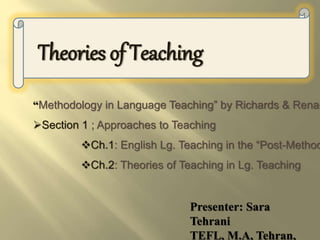
Theories of Teaching in TEFL
- 1. Theories of Teaching Presenter: Sara Tehrani TEFL, M.A, Tehran, “Methodology in Language Teaching” by Richards & Renan Section 1 ; Approaches to Teaching Ch.1: English Lg. Teaching in the “Post-Method Ch.2: Theories of Teaching in Lg. Teaching
- 2. 20th Centaury 21st Centaury ( primary concern was (more complex view to find more effective of lg. teaching ) Methods of lg. teaching) Brown traces this movement from a preoccupation with “methods” to a focus on “pedagogy”. The 1970s & 1980s were the years of greatest enthusiasm for methods. In “post-method era”, the attention has shifted
- 3. -methods: top-down impositions of experts’ views. -minimized role of the teachers. - methods are hence perspective. The problems of “designer methods” as cited by Brown - methods focus on only small part of a more complex set of elements. - “ Curriculum Development” (begins with diagnosis, moves to treatment & involves assessment.
- 4. For Brown, the term method is best replaced by the term pedagogy : Method implies a static set of procedures. Pedagogy suggests the dynamic interplay between teachers & learners.
- 5. Approach Method Technique Edward Anthony (1963) Set of assumptions dealing with the nature of lg., learning & teaching. An overall plan for systematic presentation of lg. based on a selected approach. Specific classroom activities consistent with a method, and therefore in harmony with an approach as well.
- 6. Method Approach Design Procedure Richards & Rodgers (1986)
- 7. Prabhu (1990) thought of method as both: classroom activities & the theory that informs them. For most researchers, a method is a set of theoretically unified classroom techniques thought to be generalizable across a wide variety of contexts & audiences.
- 8. Gouin’s Series Method (1880) DM (Berlitz) ALM (Late 1940s) Cognitive - Code learning method (early 1960s) Designer Methods (1989)
- 9. Why are methods no longer the milestones of our lg. teaching journey through time? 1- Methods are too perspective/ Assuming too much about a context./ They are overgeneralized. 2- At the early stages of a lg. course, methods are distinctive but later, they become indistinguishable from each other. 3- It was though that methods could be tested to determine which one is the “best”.
- 10. Therefore we did not need a method. We needed to unifying our approach to lg. teaching & of designing effective tasks & techniques informed by the approach. 1) An approach is dynamic & therefore subject to “tinkering” as a result of experience & observation. 2) Research in SLA almost always yields findings that are subject to interpretation rather than giving evidence. There are two reasons for variation at the approach level
- 11. Twelve widely accepted theoretical principles about SLA Communicative Competence Automaticity The anticipation of Reward Strategic Investment Self- confidence The lg-culture Connection Meaningful Learning Intrinsic Motivation Language Ego Risk Taking The Native Lg. Effect Interlanguage
- 12. A principled approach to lg. teaching encourages the lg. teacher to engage in a carefully created process of : treatment
- 13. diagnosis First phase “ situational needs” or the context of teaching. - country of the institution. - educational background of the students. - students’ purpose for learning the lg. Second phase “ communicative needs” - The specific lg. forms & functions that should be programmed into a course of study.
- 14. treatment The appropriate stage for the application of methods. Language “treatment” may be thought of as coursed of study, or sets of learning experiences, design to target learners’ needs exposed by diagnostic assessments. controlled semicontrolled free
- 15. 1- Lower inhibitions. 2- Encourage risk taking. 3- Build students’ self- confidence. 4- Help students develop intrinsic motivation. 5- Promote cooperative learning. 6- Encourage students to use right-brain processing. 7- Promote ambiguity tolerance. 8- Help students use their intuition. 9- Get students to make their mistakes work for them. 10- Get students to set their own goals.
- 16. assessment Finally it is the time for assessing accomplishment of curricular objectives, which can be done through: Formative evaluation (ongoing assessment of students’ performance as a course progresses.) Summative evaluation ( end-of-term or end-of-unit tests)
- 17. Conceptions of teaching (Zahorik, 1986) 1) Science-Research Conceptions 2) Theory-Philosophy Conceptions 3) Art-Craft Conceptions
- 18. 1) Science-Research Conceptions These see the essential skills in teaching as following: Examples Understand the learning principles. ALM Develop task & activities based on learning principles. TBLT Monitor students’ performance. Learner Training Zahorik includes the followings as the examples: Operationalizing learning principles. (Developing a teaching methodology from learning research.) Following a tested model. ( applying the results of empirical or experimental research to teaching) Doing what effective teachers do.
- 19. 2) Theory-Philosophy Conceptions These see the essential skills in teaching as : Understand the theory and the principles. Select syllabi, materials & tasks based on the theory. Monitor your teaching to see that it conforms to theory. Teaching conceptions which are derived from what ought to work are essentially Theory-Based or Rationalist Approaches. Examples : CLT / SW On the other hand, lies the “Value-Based Approach” which is derived from beliefs about what viewed as morally right. Examples : Humanistic Approaches, CLL, learner-centered curriculum, Reflective teaching , Team Teaching
- 20. 3) Art- Craft Conceptions The essential skills of teaching in this approach are: Treat each teaching situation as unique. Identify the particular characteristics of each situation. Try out different teaching strategies. Develop personal approaches to teaching. Examples: There are no general methods of teaching ! Teachers should do what they feel the best ! (teachers’ decision making) In contrast to the “science-research conception” which is “top-down”, this approach is “bottom-up.